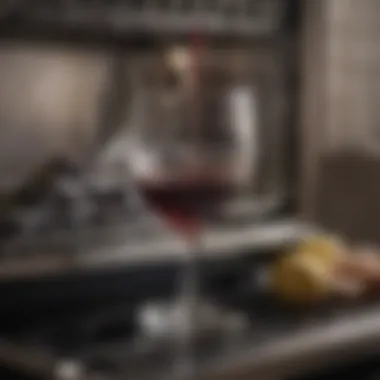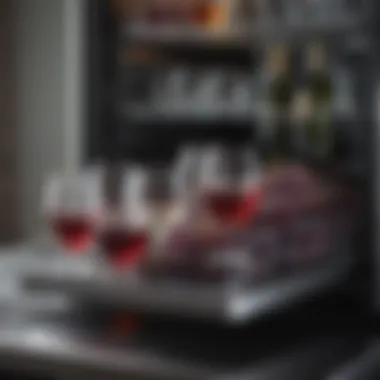Choosing the Best Dishwasher for Wine Glasses


Intro
Choosing the right dishwasher for wine glasses is a task that requires careful consideration. A dishwasher is not just a mere appliance; it plays a pivotal role in maintaining the elegance and durability of your glassware. Wine glasses, with their thin and delicate structures, demand a gentle cleaning approach. This article will help readers navigate through essential features that contribute to efficient glass washing, ensuring every glass remains pristine.
The process starts with understanding the specific needs of wine glass maintenance. Important elements such as wash cycles, drying methods, and the overall design of the dishwasher can influence the outcome of the cleaning process. Knowing the specific characteristics of wine glasses is crucial to selecting an appliance that preserves them well while also meeting the demands of everyday use.
Key Points Discussed
- Wash Cycles: Explore various cycles designed for fragile items.
- Temperature Settings: Understand the significance of gentle cleaning temperatures.
- Drying Methods: Evaluate how different drying techniques affect glassware.
- Popular Models: Review leading dishwasher brands that excel at protecting glass.
- Maintenance Tips: Learn how proper care contributes to longevity.
Through this exploration, culinary enthusiasts and home cooks will gain insights necessary for making an informed decision on dishwashers that support their wine glass collection.
Intro
Cleaning wine glasses is essential for maintaining both their aesthetic appeal and functional integrity. Wine enthusiasts understand that a pristine glass can enhance the drinking experience, allowing the flavors and aromas of the wine to be fully appreciated. However, cleaning these delicate items can pose challenges. This article aims to guide readers through the process of selecting the optimal dishwasher that caters specifically to wine glasses. By examining crucial features such as wash cycles, drying mechanisms, and temperature options, readers will gain comprehensive insights into the factors that contribute to effective cleaning.
Importance of Cleaning Wine Glasses
Without proper cleaning, wine glasses can retain residues and oils that affect taste. These remnants can also lead to unpleasant odors over time. Many people mistakenly believe that rinsing is enough. However, residues from previous wines, particularly tannins and sugars, require deeper cleansing to ensure the next pour is pure and untainted. Additionally, scratches and cloudiness can develop if wine glasses are washed improperly. A dishwasher designed for this purpose will help to preserve the delicate nature of fine glassware.
Further, wine glasses are often valuable, not just in cost but sentiment. Therefore, investing in a dishwasher that treats these glasses gently can prolong their lifespan. In an era where efficiency is key in household chores, a reliable dishwasher ensures that wine glasses are sparkling without the manual labor of hand washing.
Overview of Dishwasher Options
When exploring dishwashers for wine glasses, there are several options in the market that cater to various needs. Different brands offer a range of models with distinct features. Some models boast specialized wash cycles tailored for delicate items, while others integrate advanced drying technology to reduce the risk of water spots.
Energy efficiency is another important consideration. Many new dishwashers are designed to use less water and electricity without compromising cleaning effectiveness. This feature not only benefits the environment but also reduces utility costs. Also, it’s crucial to consider noise levels. Some consumers prefer a quieter model, especially if their kitchen is part of an open living space.
In summary, understanding the options available is crucial for making an informed decision. Homeowners should evaluate the specific washing and drying capabilities that are most beneficial for preserving wine glasses. By prioritizing versatility, efficiency, and gentleness in a dishwasher, users can ensure their wine glasses remain in excellent condition for years to come.
Key Features to Consider
Selecting a dishwasher tailored for wine glasses necessitates a careful analysis of various features that play a pivotal role in maintaining the integrity of delicate glassware. Since wine glasses are often not just functional items but also hold significant aesthetic and emotional value, it’s crucial to prioritize elements that ensure they are cleaned without damage. In this section, we will delineate the key features that should be kept in mind during the selection process. This will encompass wash cycle options, drying mechanisms, temperature settings, and racking systems.
Wash Cycle Options
An array of wash cycle options can significantly affect the cleaning results. For wine glasses, specific cycles, such as "gentle" or "glass care," are indispensable. These cycles usually use lower pressure and gentler jets of water. This helps in avoiding chips and cracks that can occur from harsher cleaning methods.
Moreover, consider features like 'sanitize' modes that can elevate the cleaning process. Utilizing ultra-cleaning settings ensures that any residues from wine are completely eliminated, leaving glasses spotless and ready for the next pour.
Drying Mechanisms
The drying method is another critical aspect that requires close examination. The method used can vary from heated drying to more innovative techniques like condensation drying. For wine glasses, effective drying is crucial to prevent water marks and enhance clarity.
Heated drying can be effective, yet it poses a risk of thermal shock to glassware.
Condensation drying, on the other hand, uses a more gentle approach by allowing water to evaporate slowly, reducing the risk of damage to delicate glasses. Choose dishwashers that offer the flexibility of multiple drying options.


Temperature Settings
Temperature settings are fundamental when dealing with glass care. High temperatures can foolishly warp or shatter thin glass, so a model that allows for controlled heat is desirable. Some dishwashers come with adjustable temperature settings that can optimize the wash cycle for various types of glassware.
Look for machines that provide lower temperature options specifically for glass. This control is essential for ensuring that wine glasses are not just cleaned but preserved.
Racking Systems
Racking systems also merit consideration when selecting a dishwasher for wine glasses. A well-designed racking system can hold glasses securely in place, reducing the risk of collisions that could lead to breakage. Models that feature adjustable racks or fold-down tines are particularly beneficial, as they can accommodate a variety of glass shapes and sizes.
For the discerning wine enthusiast, there are dishwashers with dedicated wine glass slots that provide extra support and stability during a wash cycle. A carefully thought-out racking system plays a vital role in both the effective cleaning and the longevity of your glassware.
Each of these features contributes to a larger picture of wine glass maintenance. Understanding these options empowers users to select the most appropriate dishwasher, safeguarding their cherished glassware for years to come.
Popular Dishwashers for Wine Glasses
When selecting a dishwasher that can effectively clean wine glasses, it is crucial to consider the specific models that have been recognized for their efficiency and performance. The reason this section is important is that different dishwashers come with varied features that can substantially impact the longevity of your delicate glassware. An optimal dishwasher will not only clean effectively but also preserve the integrity of each glass, preventing unwanted damage.
In reviewing popular dishwashers suitable for wine glasses, we'll look at critical elements such as the unique features each brand offers, user feedback that reflects real-world reliability, and the economic aspects that can influence buying decisions. This information helps discerning buyers to choose models that match their needs without compromising on quality.
Brand A: Features and Performance
Brand A, known for its user-friendly interface and innovative technologies, offers several features that stand out. One notable aspect is its dedicated wine glass cycle, designed to provide gentle yet effective cleaning and thorough drying. This cycle ensures that wine glasses receive the care they require while still delivering excellent cleaning results.
Another key feature is the adjustable racking system, which allows users to customize the layout based on the size and shape of their glasses. With a higher spin speed during the rinse cycle, the dishwasher can remove stubborn residues without damaging the glass surface. Users frequently appreciate this offering because it accommodates various types of glassware beyond just wine glasses.
The performance of Brand A has earned numerous accolades for its efficiency in water and energy usage, aligning well with sustainable practices that many users value.
Brand B: User Reviews and Reputation
Brand B has gained a solid reputation among consumers, marked by positive user reviews highlighting its reliability. Customers frequently mention the model's durability, emphasizing how it withstands regular use without issues. Many advocate for Brand B’s effective cleaning technology, which includes adjustable wash cycles tailored for fragile items.
Moreover, user experiences often cite the quiet operation when running, making it a suitable choice for open-concept living styles where noise can be disruptive.
Social proof in the form of user testimonials across platforms such as Reddit and various appliance review sites suggest that Brand B consistently meets user expectations, making it a favorable option for anyone looking to maintain quality wine glassware over time.
Brand C: Cost-Benefit Analysis
Brand C presents a compelling case for budget-conscious buyers interested in preserving their wine glasses. Its pricing model is competitive, which is attractive to potential buyers looking for value without sacrifice.
In terms of features, Brand C includes essential cycles for wine glasses, though it may not have as many high-end options as other brands. However, the cost-effectiveness comes from its reliability in handling delicate glassware, which helps to reduce replacement costs.
A cost-benefit analysis suggests that for those with limited budgets, Brand C is an intelligent choice. Its effective performance in cleaning and care for wine glasses is combined with lower operational costs and reasonable initial investment, making it an attractive proposition in the crowded dishwasher market.
"Choosing the right dishwasher involves weighing features against your own needs and budget. Make an informed choice for the care of your wine glasses that fits your lifestyle."


In summary, when considering popular dishwashers for wine glasses, it is important to critically evaluate the specific features, user experiences, and overall value each option provides. Making informed decisions can enhance the longevity and aesthetics of wine glasses, ensuring they remain a cherished part of your culinary experiences.
Maintenance and Care
When selecting a dishwasher specifically for wine glasses, maintenance and care are crucial elements that can significantly determine overall performance and longevity. Proper upkeep of both the dishwasher and the wine glasses themselves ensures that users can enjoy their glassware without worrying about damage or deterioration. The discussion in this section will clarify key aspects of maintaining your dishwasher and glassware, along with their associated benefits.
Cleaning the Dishwasher
Regular cleaning of the dishwasher is essential for optimal functioning. Over time, food particles, grease, and mineral deposits can accumulate within the machine, potentially affecting the wash quality. To maintain clean performance, start by removing any leftover debris from the filter and spray arms. A routine of monthly cleanings is advisable.
One simple method involves running an empty cycle with a cup of white vinegar placed in the top rack. The vinegar helps dissolve any buildup and neutralizes odors. Alternatively, commercial dishwasher cleaners can also be used for a more thorough approach.
Inspecting Wine Glasses
Beyond just cleaning the dishwasher, it's equally important to inspect the wine glasses themselves regularly. Check for any signs of chips, cracks, or cloudiness that may indicate wear. Inspecting glasses after each wash can prevent gradual deterioration. Not only does this practice help maintain the aesthetic of the wine glasses, it also ensures that they remain safe to use. Damaged glasses can pose a risk of injury and can detract from the enjoyment of your favorite wines.
Preventing Damage to Glassware
When using a dishwasher, taking measures to prevent damage to wine glasses is paramount. Here are some actionable tips to consider:
- Positioning: Place wine glasses securely on the upper rack, away from the spray arms, to avoid any accidental collisions.
- Washing Settings: Utilize gentle or delicate wash settings that are designed specifically for fragile glassware. This minimizes agitation and keeps glasses safer.
- Rinsing: Rinse wine glasses before loading them into the dishwasher to prevent dirt and residue from baking onto the surface during the wash cycle.
- Avoid Overloading: Do not overcrowd the dishwasher, as this can lead to the glasses knocking against one another, resulting in scratches and chips.
Proper maintenance and care for both the dishwasher and glasses create an environment that enhances the longevity and enjoyment of your wine experience.
By dedicating a bit of time to these maintenance tasks, users can significantly enhance the lifespan of their dishwashers and wine glasses, ensuring that they remain in excellent condition for many years.
User Considerations
When selecting a dishwasher specifically tailored for wine glasses, it is crucial to consider user requirements. The choices made by the user can greatly impact the performance and efficiency of the appliance. Moreover, understanding individual needs helps in aligning the features of the dishwasher with the actual usage.
Three key areas merit attention: size and capacity, energy efficiency ratings, and noise levels. Each of these aspects contributes to an overall satisfying experience, ensuring that the investment will meet expectations in cleaning delicate glassware.
Size and Capacity Requirements
The size and capacity requirements of a dishwasher are fundamental in ensuring that wine glasses, along with other dishes, fit comfortably. This consideration directly affects the efficiency of cleaning. A dishwasher must be spacious enough to handle various glassware types without risking any breakage.
Typically, wine glasses come in different shapes and sizes. Standard dishwashers can accommodate around 12 to 16 place settings. However, for users who entertain regularly or possess numerous wine glasses, a larger capacity becomes essential. Some models provide adjustable racks and specialized wine glass holders, optimizing storage and accessibility.
In addition, the overall dimensions of the appliance matter. A compact model may be suitable for smaller kitchens but could limit capacity. Therefore, matching the dimensions of the space in which the dishwasher will be installed is necessary to avoid potential inconveniences.
Energy Efficiency Ratings
Energy efficiency ratings indicate how much power an appliance consumes compared to its performance. Understanding energy efficiency is essential for both environmental consideration and cost-saving in the long run. A highly rated dishwasher uses advanced technologies to minimize energy use while maintaining cleaning efficacy.
Choosing a model with a good energy efficiency rating can lead to significant savings on utility bills. Look for dishwashers with Energy Star certification. These models meet strict energy consumption guidelines, making them a reliable choice.


Furthermore, selecting energy-efficient machines often means they operate at lower noise levels and provide specific wash cycles that save water, which is beneficial when considering the delicate nature of wine glasses.
Noise Levels
Finally, the noise levels of a dishwasher can influence the decision-making process. Wine glasses are often cleaned in settings where silence enhances the experience. Whether during a quiet dinner or a sophisticated wine tasting, loud appliances can detract from the atmosphere.
Most modern dishwashers come with sound ratings measured in decibels (dB). A rating below 50 dB is typically considered quiet, while extra-sensitive environments may require even quieter units. Users should be attentive to these ratings, especially if they host gatherings frequently.
In summary, user considerations in selecting a dishwasher for wine glasses revolve around practical needs and lifestyle choices. As simple as size, energy efficiency, and noise levels may seem, they hold significant weight in ensuring user satisfaction. Proper evaluation of these factors will lead to better decision and a more functional kitchen.
Final Recommendations
When it comes to selecting a dishwasher suited specifically for wine glasses, the final recommendations section serves as a crucial guide for informed decision-making. This part of the article synthesizes the essential findings and offers clarity on which models align best with the needs of wine enthusiasts. By focusing on both high-end and budget-friendly options, it ensures there are solutions for a diverse audience, catering to varying levels of investment and preference.
In this section, readers should consider the specific elements that contribute to a successful washing experience for delicate wine glasses. Factors such as the rinse cycle effectiveness, the gentleness of drying systems, and overall build quality are paramount. Efficiency, convenience, and the preservation of glass integrity directly affect longevity, both for the dishwasher and the wine glasses it cleans. Also, evaluating additional features such as noise levels and energy savings can enhance the overall user experience.
"The right dishwasher can enhance your overall enjoyment of wine by ensuring your favorite glasses remain in pristine condition."
Best-in-Class Models
Choosing the best-in-class models requires a closer look at dishwashers that combine advanced technology with reliable performance. Models such as Miele G 7000 Series and Bosch 800 Series are often highlighted due to their exceptional features tailored toward fragile glassware. Miele's design offers a dedicated wine glass program that gently cleans while minimizing potential damage. The Bosch 800 Series, on the other hand, utilizes a flexible racking system that can accommodate a variety of glass shapes and sizes.
These top-tier models often incorporate high-performance wash cycles and specialized drying methods that use gentle heat to protect glassware while ensuring thorough cleanliness. High-efficiency energy ratings are common in these models, confirming their reliability as long-term investments. The extra features, including customizable settings, further enhance user convenience.
Budget-Friendly Options
For those mindful of their budget, several dishwashers can still effectively meet the needs of wine glass cleaning without compromising quality. Models like the Whirlpool WDT710PAHZ and Frigidaire FFBD1831US stand out as commendable choices for cost-conscious users. Both of these provide useful wash options and sufficient capacity for household needs while emphasizing reliable performance.
Budget models may lack some of the high-end enhancements seen in premium versions, but they often include basic cycle options that can efficiently clean wine glasses. With straightforward designs, these dishwashers take up a modest amount of space and are user-friendly.
When opting for a budget-friendly option, consumers should prioritize specific features such as adjustable racks and a decent drying method, while still ensuring they maintain the delicate nature of wine glasses. It’s important to assess warranty options as well, as this can indicate the manufacturer’s confidence in their product's durability.
Closure
Wine lovers and culinary enthusiasts recognize the importance of gentle handling and proper maintenance. A well-selected dishwasher equipped with appropriate wash cycles, temperature settings, and drying mechanisms can significantly reduce the risk of chips and scratches. This is vital as delicate wine glasses can easily suffer damage under intense cleaning processes.
Selecting the correct model is equally essential. A machine that supports custom racking systems can ensure that your wine glasses are securely in place during washes, while energy efficiency ratings help in maintaining sustainability efforts. It's not just about cleaning; it is about safeguarding your investment in fine glassware.
The collective understanding gathered from previous sections allows readers to make educated choices that align with their specific needs and preferences.
Summary of Recommendations
To summarize, here are the main recommendations for choosing the ideal dishwasher for wine glasses:
- Opt for models with specialized wash cycles focused on fragile glassware.
- Look for adjustable racking systems to accommodate the shape and size of various wine glasses.
- Prioritize energy-efficient models that reduce overall environmental impact.
- Ensure reliable drying mechanisms that avoid water spots or streaks on glass surfaces.
These elements will help secure the longevity of your wine glasses and elevate your dishwashing experience.
Encouragement to Explore Options
Finally, I encourage readers to explore various options when selecting a dishwasher. Each household has unique needs, and finding one that fits personal preferences is essential. Take the time to read reviews, compare features, and consider warranties. Engaging in these steps will lead to better choices that enhance both the practicality and enjoyment of wine glass cleaning.
Researching models on platforms such as Reddit can provide valuable insights and experiences from other users. Furthermore, websites like Wikipedia or Britannica can offer background information on technology that underlies modern dishwashers.



